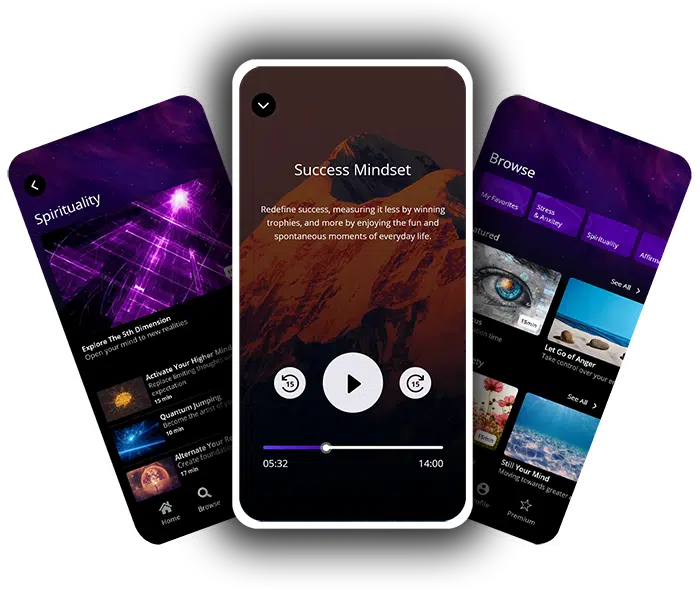Feeling emotions deeply can sometimes make you wonder if what you’re feeling is yours or someone else’s. The term “empath” describes this unique ability to tune into the emotions of those around you.
This article sheds light on signs that might reveal if you’re an empath and offers strategies for managing your empathy effectively. Curious? Keep reading.

Unleash Your True Potential!
Explore the world of meditation with our powerful guided sessions crafted to bring peace and strength to your spirit.
But first, let’s ensure our sessions are the perfect fit for you.
Take our short quiz to find out!
Table of contents
Key Takeaways
- Empaths feel and absorb other people’s emotions as their own, making it hard to tell where their feelings end and another’s begin.
- Crowded places can overwhelm empaths because they pick up emotions from others, needing alone time to recharge after such experiences.
- Being an empath means having a heightened sensitivity not just to emotions but also to sensory stimuli like lights, noises, and textures.
- Different types of empaths include Emotional Empaths, Physical Empaths, and Intuitive Empaths, each experiencing the world in unique ways.
- Managing empathy involves setting healthy boundaries, emphasizing self-care through activities like meditation or nature walks, and building supportive relationships.
What Is an Empath?
An empath is someone with the unique ability to feel and absorb the emotions of others as if they were their own. This trait comes from a deep place of empathy—the kind where you understand what someone else is going through without them having to say a word.
You might find people often tell you their problems, or you’re told that you are “too sensitive.” It’s because your gift allows you to tune in to the feelings, needs, wishes, and even fears of those around you.
Empaths don’t just hear; they feel the emotions and energies present in a room or within another person.
You tend to pick up on subtle cues others miss—like slight changes in tone or body language—letting you read situations and people more deeply. Sometimes this can be overwhelming, especially in crowded places filled with various energies or when trying to set personal boundaries.
Yet it also allows for forming deep connections and understanding animals and nature on a profound level. Let’s delve into recognizing the signs of being an empath next….
Recognizing the Signs of Being an Empath

Do you often feel overwhelmed in crowded places? Absorbing emotions from others may be a sign of being an empath. Also, if you find yourself needing time alone to recharge, that could indicate your empathetic nature.
Absorbing Emotions from Others
You might find yourself soaking up the feelings of those around you, like a sponge absorbing water. This happens because empaths have a unique ability to tune into others’ emotions deeply and intensely.
You’re in a room, and suddenly, you feel sad, happy, or anxious without any reason. The truth is, these aren’t your feelings; they belong to someone else in the room. Empaths often feel what others are feeling so strongly that it can be hard to tell where their own emotions end and another’s begin.
This skill lets you understand people on a deeper level — not just hearing their words but actually feeling what they’re going through. It’s why people tend to open up to you and share their problems; they sense your empathic nature.
But absorbing the emotions of others comes with its challenges too. You may become overwhelmed or drained if you’re constantly exposed to strong emotions from other people without taking time for self-care or setting healthy boundaries.
Taking care of yourself isn’t selfish; it’s necessary, especially when you’re highly sensitive to the energies around you. Finding ways to recharge alone after being with others helps manage this gift of empathy without letting it turn into a burden.
Spending time in nature or engaging in activities that bring joy can help clear your mind and restore your emotional balance.
Feeling Overwhelmed in Crowded Places
Being in big crowds can make you feel swamped. This happens a lot if you’re an empath. Your senses pick up more than just noises and sights; they grab emotions from people around you too.
Imagine this like your mind is a sponge, soaking up feelings—both good and bad—from others without even trying. You might notice this when you step into a busy mall, attend a packed concert, or find yourself in the middle of a bustling street festival.
Suddenly, it’s like the air gets thick with all these unseen vibes, making it hard to breathe.
Needing time alone after such experiences is essential for empaths. It helps clear your head and wash away the emotional overload that crowds dump on you. Think of it as hitting the refresh button on your emotional state—like getting some quiet time after a long day’s noise but much deeper because what drains you isn’t physical activity; it’s absorbing those heavy doses of everyone else’s feelings and moods without meaning to.
Empaths crave solitude not because they dislike people but because they need to recharge their internal batteries to manage empathy effectively again amidst life’s social hustle.
Sensitivity to Sensory Stimuli
You might find that sensory stimuli affect you more deeply than others. Bright lights, loud noises, strong smells, or even textures may overwhelm you at times. This heightened sensitivity to your surroundings is a common trait among empaths and can lead to feeling drained or anxious in certain environments.
It’s essential to recognize this sensitivity and take the necessary steps to manage it effectively.
This aspect of being an empath often means that you need quiet spaces and soothing atmospheres where you can find relief from overwhelming sensory input. Implementing calming techniques like deep breathing or meditation can provide respite when your senses are on overload.
Embracing strategies tailored specifically for sensitive individuals could significantly enhance your overall well-being and help maintain a healthy balance in various settings.
Needing Time Alone to Recharge
After being in crowded places or around heavy emotions, you might feel drained. This is because empaths absorb energy from others and often need time alone to recharge. It’s essential for empaths to find a quiet space where they can relax, unwind, and process their own feelings free from the influence of others.
During this alone time, an empath can engage in activities that bring them peace and calm, such as meditation or spending time in nature. Utilize this time to reconnect with your inner self, release any absorbed negative emotions, and restore your mental well-being.
Remembering to allocate this time ensures that you’re better equipped to handle the emotional intensity of everyday interactions.
Struggling to Set Personal Boundaries
Struggling to set personal boundaries can be tough for empaths. You often prioritize others’ needs over your own, making it hard to say no… It’s okay to make yourself a priority and set limits with those around you.
Embrace the fact that setting boundaries is essential for your emotional well-being and overall health. Finding a balance between being supportive and asserting your limits will help you thrive as an empath.
It’s crucial to recognize that setting personal boundaries isn’t selfish; it’s about self-care… Take time for yourself without feeling guilty – it’s necessary for your mental and emotional strength.
Be mindful that saying no doesn’t mean rejecting someone but instead respecting your own needs too… Remember, establishing healthy personal boundaries is key to cultivating better relationships built on mutual respect and understanding.
Different Types of Empaths

Empaths come in diverse forms, including Emotional Empaths who absorb the feelings of others, Physical Empaths who feel other people’s physical pains, and Intuitive Empaths who deeply understand the emotions and intentions of those around them.
These distinct types of empaths shape how individuals experience and engage with the world.
Emotional Empaths
If you’re tuned into other people’s emotions and feel them deeply as if they are your own, you may be an emotional empath. You have a natural ability to attune to the feelings of others, even experiencing their pain or joy as your own.
It can be overwhelming at times, but it also allows you to form deep connections with those around you and understand them on a profound level. The downside is that absorbing negative energy can lead to feeling emotionally drained.
Navigating life as an emotional empath means setting healthy boundaries to protect yourself from being overwhelmed by others’ emotions. It’s essential for self-care to take the time you need alone in quiet environments for recharging purposes.
Despite the challenges, being an emotional empath enables you to offer genuine support and compassion that many people find valuable in their lives.
Physical Empaths
Physical empaths are highly attuned to the physical sensations and energy of those around them. You may find yourself experiencing physical symptoms that mirror those of others, such as feeling fatigue or pain in your body that you cannot explain.
This can be especially overwhelming when in crowded places or around individuals who are carrying a heavy emotional or physical burden.
In addition, as a physical empath, you might have an innate ability to detect subtle changes in the environment, including fluctuations in temperature, changes in air pressure, and even disruptions in electromagnetic fields.
These sensitivities can manifest as feeling uncomfortable or unwell in certain spaces. It’s important for you to recognize these signs and prioritize self-care by finding ways to recharge your energy and establish healthy boundaries with others.
Intuitive Empaths
Now, moving on from Physical Empaths to Intuitive Empaths – let’s dive into the realm of intuition and empathy. Intuitive empaths are highly attuned to the feelings of others and have a deep understanding of emotions that go beyond what is spoken.
They often experience heightened intuition and may sense things before they happen.
Intuitive empaths possess a remarkable ability to comprehend unspoken emotions, making them incredibly perceptive in their interactions with others. They tend to pick up on subtle cues that reveal people’s true feelings and are adept at recognizing when someone is being insincere or hiding their emotions.
This keen insight enables intuitive empaths to form deep connections with those around them, offering understanding and support even without words.
Empath test results give weight to evidence suggesting that intuitive empaths can sense the energy within a group or environment. These individuals may feel overwhelmed by negative atmospheres but thrive in positive, uplifting surroundings where they can harness their innate ability to uplift others while enhancing their own well-being through these affirming energies.
Empower yourself as an empath by embracing this unique gift; acknowledge your heightened sensitivity as your strength rather than a burden.
Related: Empath Personality Type & Personality Traits: Know If You Are One Of Empaths?
Facing the Challenges and Embracing the Benefits of Empathy
Managing empathy can be tough, but it’s worth it. Seek the positives and strive to form deep connections in your journey as an empath. Intrigued? Read more on our blog!
Challenges: Coping with Emotional Overload and Isolation
Coping with emotional overload can be overwhelming. You may find it challenging to distinguish your feelings from those around you, leaving you drained. Isolation becomes necessary for recharging, yet it can also bring a sense of loneliness and disconnection.
Finding the balance between empathy and self-preservation is vital in managing these challenges.
Nurturing supportive relationships while setting healthy boundaries empowers you to navigate emotional overload effectively. Embracing solitude as an opportunity for self-care is crucial.
Learning to recognize when sensory stimuli are becoming overwhelming helps in proactively managing emotional exhaustion, allowing you time to recharge without guilt or shame.
Benefits: Forming Deep Connections and Enhancing Intuition
Forming deep connections is a perk of being an empath, letting you truly understand and bond with others on a profound level. Your natural ability to sense the emotions of those around you can forge strong and authentic relationships.
This can make people feel understood and valued, creating enduring connections based on empathy and understanding.
Enhancing intuition goes hand in hand with being an empath. You tend to pick up on subtle cues and gut feelings about people and situations, often anticipating outcomes or reading between the lines.
This heightened intuition allows you to navigate social interactions with empathy, making you adept at offering support – both emotionally and intuitively – to those around you.
Remember, as an empath, forming deeper connections and enhancing your intuition are powerful assets that enrich your life and the lives of those around you.
Strategies for Managing Empathy

- Set clear boundaries to protect your emotional well-being.
- Prioritize self-care activities such as meditation, exercise, and spending time in nature.
- Cultivate supportive relationships with understanding individuals who respect your sensitivities.
Ready to dive deeper into managing your empathy? Visit our blog for the full scoop!
Setting Healthy Boundaries
Setting healthy boundaries is crucial for empaths like you. It’s necessary to protect your energy and well-being. Learn to say no when needed and communicate your limits clearly. Take time for yourself without feeling guilty, and surround yourself with supportive people who respect your boundaries.
Remember that setting healthy boundaries is an act of self-care, helping you maintain emotional balance and prevent burnout from absorbing others’ emotions excessively.
Emphasizing Self-Care
Now that you’ve mastered setting healthy boundaries, it’s essential to focus on self-care. Being an empath means you absorb a lot of emotions and energy from others, which can take a toll on your well-being.
Taking time for yourself is crucial in managing your empathy. Maintain balance by practicing mindfulness techniques like meditation and deep breathing exercises. Make sure to prioritize activities that bring you joy and relaxation, such as spending time in nature or engaging in creative pursuits.
Nurturing your own physical and emotional needs will help you recharge and maintain a strong sense of well-being amidst the demands of being an empath.
Building Supportive Relationships
To build supportive relationships, start by setting clear boundaries to protect your energy. Communicate your needs and limits openly to create a healthy environment. Prioritize self-care and recharge regularly to prevent emotional exhaustion.
Seek connections with understanding individuals who respect your sensitivity. Surround yourself with empathetic people who can validate your emotions without judgment. Embrace deep conversations and profound connections that foster mutual support and understanding within the realm of spirituality.
Engage in activities that resonate with compassionate souls, such as nature walks, meditation circles, or volunteer work dedicated towards compassion for humanity and animals alike.
Establish a network of like-minded individuals in spiritual communities or support groups to exchange experiences and gain insights into nurturing meaningful connections while remaining true to your empathic nature.
In these partnerships, aim for enhanced understanding of each other’s emotions as you navigate through the depths of empathy together.
Conclusion
In conclusion, recognizing the signs of being an empath is crucial for understanding your unique abilities. Knowing that you may absorb emotions from others, feel overwhelmed in crowds, and need alone time to recharge are essential insights.
Understanding different types of empaths can help you identify your strengths and challenges. Embracing empathy means facing its difficulties while leveraging its benefits by setting boundaries, prioritizing self-care, and building supportive connections.
By recognizing these signs and managing your empathy effectively, you can navigate the complexities of being an empath with confidence and resilience.
FAQs
1. How do you know if you’re an empath?
You feel things deeply, more than others seem to. If someone’s sad, it’s like you’re wearing their shoes – their pain is yours. You pick up on emotions fast, sometimes even before they do. That’s a big sign.
2. What are the signs of being highly sensitive?
If lights seem too bright or sounds too loud, and crowds make you want to escape, you might be highly sensitive. It means your senses dial up higher than most people’s.
3. Can being an empath affect relationships?
Yes, it can… Being so in tune with others’ feelings means you often take on their stress or sadness as your own. Setting boundaries helps prevent feeling overwhelmed by someone else’s emotions.
4. Do empaths need time alone?
Absolutely! With all that emotional input from others, taking time out is crucial for recharging those mental batteries… Think of it as pressing the reset button on your sensitivity levels.
5. Is there such a thing as a dark empath?
Indeed—this term refers to someone who understands emotions well but might use this knowledge for personal gain rather than helping others… A tricky balance between empathy and manipulation.
6. How can I manage my empathy without getting drained?
Learn to set limits; not every battle needs your energy… Also, practice self-care routines that ground you and remind yourself: It’s okay not to carry everyone else’s emotional baggage.










